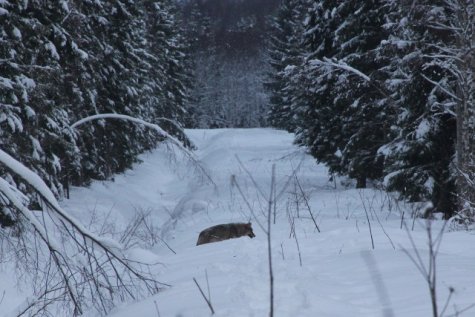About the research of wolves in America
Translation: SilverT
Our radio transmitter-equipped wolves, "Hall" ("Grey“) and "Habe" ("Beard“) are roaming around in our forests and know nothing about what people think of them. However, people`s opinion does matter.
Recent research in America (DOI: 10.1111/cobi.12009) clearly shows that the preservation and also the re-establishment of wolf population is full of contradictions and contrasts. The research summarises the changes in people`s opinion before and after the re-establishment of wolf territory in Wisconsin.
Interesting facts become evident. If the wolf population has already been destroyed once and the former habitat is being restored, it naturally causes changes in the ecosystems. Meanwhile, people have become accustomed to so-called wolf-free habitation and consider it as a norm, not a deviation. For that reason, the return of the wolves causes the opinion to change towards negative direction at first. The main cause for such a shift in attitude in Wisconsin was not so much the livestock farmers`fear for their animals, but the hunters`vision of the wolf as too powerful of a competitor for other game animals.
What to conclude from that? Still this – as long as the wolves are our constant companions, we are accustomed to them and their activities near by us do not cause much anger. But once they are gone, the re-establishment of a wolf population may be extremely complicated, because it may prove to be very difficult getting used to a life with wolves again.
So, we wish for a long life to "Hall“ and "Habe“ and sustainability for their brothers.
Recent research in America (DOI: 10.1111/cobi.12009) clearly shows that the preservation and also the re-establishment of wolf population is full of contradictions and contrasts. The research summarises the changes in people`s opinion before and after the re-establishment of wolf territory in Wisconsin.
Interesting facts become evident. If the wolf population has already been destroyed once and the former habitat is being restored, it naturally causes changes in the ecosystems. Meanwhile, people have become accustomed to so-called wolf-free habitation and consider it as a norm, not a deviation. For that reason, the return of the wolves causes the opinion to change towards negative direction at first. The main cause for such a shift in attitude in Wisconsin was not so much the livestock farmers`fear for their animals, but the hunters`vision of the wolf as too powerful of a competitor for other game animals.
What to conclude from that? Still this – as long as the wolves are our constant companions, we are accustomed to them and their activities near by us do not cause much anger. But once they are gone, the re-establishment of a wolf population may be extremely complicated, because it may prove to be very difficult getting used to a life with wolves again.
So, we wish for a long life to "Hall“ and "Habe“ and sustainability for their brothers.
Far away from us, the mangrove forests of Sundarban are disappearing rapidly, because of human activities: LINK
These forests are the habitat of the most viable population of another large predator, the bengal tiger. Losing that habitat would also mean losing the most important stronghold of this species...









